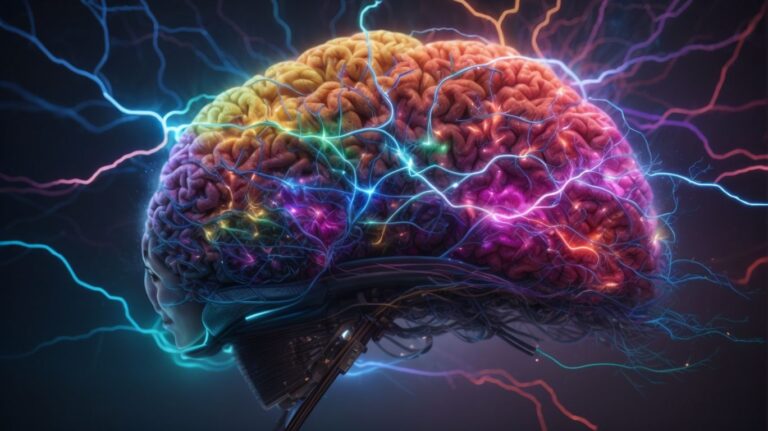Have you ever experienced moments where your thoughts suddenly come to a halt, leaving you struggling to express yourself or losing track of what you were saying? This phenomenon is known as thought blocking, and it can be a challenging experience for many individuals.
In this article, we will delve into the causes, symptoms, diagnosis, treatment options, and management strategies for thought blocking in psychology. So, let’s uncover the mysteries behind this intriguing aspect of the human mind together.
Contents
What Is Thought Blocking?
Thought blocking is a cognitive symptom often observed in individuals with schizophrenia, characterized by abrupt interruptions in the flow of thought or speech, leading to disjointed and fragmented communication.
This phenomenon disrupts the normal progression of ideas, causing a sudden halt or pause in verbal expression, manifesting as though the individual’s **thoughts are abruptly cut off or disappear**, leaving behind incomplete sentences.
Individuals experiencing thought blocking may struggle to articulate their ideas effectively, experiencing a sense of confusion and frustration as their train of thought derails unexpectedly.
In formal thought processes, which involve logical and sequential thinking, thought blocking can severely impair the ability to maintain a coherent chain of reasoning. This interruption in the cognitive pattern complicates communication and challenges comprehension not just for the individual affected but also for those interacting with them.
What Causes Thought Blocking?
Thought blocking can arise from disruptions in cognitive functions related to self-awareness and self-presence, leading to disturbances in the seamless flow of thoughts and speech.
When an individual experiences thought blocking, it often manifests as a sudden halt in their train of thought, where they struggle to retrieve or articulate information despite knowing it. These disruptions in cognitive functions can stem from various factors, including heightened levels of stress or anxiety, which can overwhelm the mind and hinder concentration. Issues with self-awareness may exacerbate thought blocking as individuals may struggle to monitor and regulate their cognitive processes effectively.
Mental Health Disorders
Thought blocking is commonly associated with various mental health conditions, such as schizophrenia, where individuals may experience disruptions in thought processes that affect their ability to express themselves cohesively.
Thought blocking in the context of mental health disorders like schizophrenia can significantly impact an individual’s capacity for empathy and communication. It can create barriers to understanding the emotions and experiences of others, hindering their ability to connect on a deeper level. Empathy, a crucial component of healthy relationships, may be compromised as thought disorder disrupts the ability to fully engage with others and comprehend their perspectives.
Medications
Certain medications prescribed for conditions like schizophrenia may have cognitive side effects, potentially contributing to symptoms like thought blocking due to cognitive deficits or disturbances in cognitive functions.
These medications, such as typical and atypical antipsychotics, are commonly used in the treatment of schizophrenia to manage symptoms. They can impact cognitive abilities by affecting neurotransmitters in the brain.
Cognitive deficits can result in difficulties with memory, attention, and executive functions, leading to issues like thought blocking where a person’s flow of thought is abruptly interrupted or blocked.
In some cases, the therapeutic effects of these medications may be overshadowed by the cognitive side effects, exacerbating cognitive deficits and increasing the likelihood of thought blocking episodes. It is crucial for healthcare providers to monitor and adjust medication regimens carefully to minimize these cognitive impacts and optimize the overall treatment outcomes.
Substance Abuse
Substance abuse, when co-occurring with schizophrenia, can exacerbate symptoms like thought blocking, intensifying cognitive disturbances and impairing the ability to maintain coherent thought processes.
Individuals with schizophrenia who engage in substance abuse may experience increased hallucinations, delusions, and disorganized thinking due to the interaction between the two conditions. This can further complicate the already challenging nature of managing schizophrenia.
Schizophrenia itself is a complex mental health disorder that affects how a person thinks, feels, and behaves, and when coupled with substance abuse, the treatment process becomes more intricate.
What Are the Symptoms of Thought Blocking?
Symptoms of thought blocking include difficulties in expressing thoughts and ideas coherently, abrupt interruptions in speech patterns, and the sensation of losing the train of thought mid-conversation.
These symptoms are indicative of cognitive challenges and disruptions related to formal thought processes. Individuals experiencing thought blocking may struggle to maintain a logical flow of ideas, leading to disjointed conversations and fragmented narratives.
Along with cognitive aspects, language impairments are also common with thought blocking. People may find it challenging to find the right words, experience involuntary pauses in speech, or even completely halt their verbal expressions, resulting in frustrating communication breakdowns.
Difficulty Expressing Thoughts and Ideas
One of the key symptoms of thought blocking is the difficulty individuals face in expressing their thoughts and ideas clearly, often accompanied by qualitative alterations in linguistic patterns and semantics.
Qualitative alterations in language could manifest as changes in the depth or complexity of vocabularies used, leading to ambiguous communications.
When thought blocking occurs, individuals may struggle to maintain a coherent flow of ideas, with sudden breaks in speech or writing that disrupt the continuity of their narrative.
This challenge in communication can be frustrating not only for the individual experiencing it but also for those trying to understand their thoughts.
Abrupt Interruptions in Speech
Thought blocking manifests as sudden interruptions in speech flow, where individuals may pause abruptly or struggle to continue their narrative, reflecting underlying phenomenological and cognitive deficits.
Phenomenologically, these interruptions disrupt the seamless connection between thoughts and verbal expression, leading to disjointed communication. These interruptions can be distressing for both the speaker and the listener, as the flow of information is hindered.
Cognitive deficits, such as impaired attention or working memory, are often associated with thought blocking. This can impact the ability to retrieve and organize thoughts cohesively, further complicating the process of verbal communication.
Loss of Train of Thought
Individuals experiencing thought blocking may struggle with maintaining a coherent train of thought, where the sense of self-presence and cognitive continuity is disrupted, leading to qualitative changes in thought processes.
Thought blocking can create a disjointed mental experience, with sudden halts or gaps in the flow of thoughts, impeding the natural progression of ideas. This interruption not only hampers the ability to express oneself effectively but also complicates the internal dialogue, affecting the individual’s perception of self-presence and cognitive coherence.
As a result, the disruption caused by thought blocking can induce variability in the quality of the thought process, altering the depth and clarity of one’s ideas. This cognitive disturbance can further manifest in difficulties in decision-making, problem-solving, and overall mental acuity.
How Is Thought Blocking Diagnosed?
The diagnosis of thought blocking typically involves assessing speech patterns and thought coherence using standardized measures, often relying on inter-rater reliability and statistical analyses for consistency.
Inter-rater reliability plays a crucial role in ensuring that different evaluators are consistent in their assessments of thought blocking symptoms. Multiple raters independently analyze the speech patterns and coherence of a patient’s thoughts to minimize subjective biases and improve the overall reliability of the diagnostic process.
Statistical methods are then applied to evaluate the collected data objectively, identifying any patterns or anomalies that may indicate the presence or severity of thought blocking. Measures such as variance analysis and chi-square tests help quantify the degree of speech disruptions and assist in establishing a standardized approach to diagnosing this cognitive phenomenon.
What Are the Treatment Options for Thought Blocking?
Treatment options for thought blocking may involve therapeutic interventions aimed at enhancing cognitive functions and speech coherence, drawing from cognitive science principles to address underlying disturbances.
One effective approach involves cognitive-behavioral therapy, which focuses on restructuring negative thought patterns and promoting clear communication.
Speech therapy sessions can help individuals improve their articulation and fluency. Another treatment method is dialectical behavior therapy, which emphasizes mindfulness and coping strategies to manage thought disruptions.
Furthermore, incorporating medication that targets neurotransmitter imbalances in the brain can aid in minimizing thought blocking episodes.
A comprehensive treatment plan combining various therapies is often recommended to address the multifaceted nature of thought blocking.
Medications
Pharmacological treatments can be prescribed to manage thought blocking by modulating aspects of the cognitive-perceptual world influenced by the phenomenological tradition of addressing symptoms.
When an individual experiences thought blocking, which is characterized by sudden stops in the natural flow of thinking, medications can play a crucial role in restoring cognitive processes. These medications target specific neurotransmitters in the brain, such as dopamine and serotonin, which are known to influence perception, cognition, and consciousness.
By altering the levels of these neurotransmitters, medications can help to regulate the cognitive-perceptual distortions that contribute to thought blocking. This approach aligns with the phenomenological tradition, which emphasizes understanding mental phenomena as they are experienced subjectively by the individual.
Therapy
Therapeutic interventions for thought blocking aim to mitigate cognitive deficits and alleviate disruptive self-awareness issues, promoting better thought coherence and communication skills.
Therapy plays a crucial role in addressing thought blocking by utilizing various techniques to enhance cognitive functions and self-awareness. Therapists may employ cognitive-behavioral approaches to challenge distorted thought patterns and improve logical thinking. Through psychoeducation and skill-building exercises, individuals can learn to recognize and manage thought-blocking episodes effectively.
Therapy fosters self-reflection and insight, helping individuals understand the root causes of their cognitive deficits and disrupted self-awareness. By exploring these underlying issues, therapy aims to promote self-acceptance and develop coping strategies for more coherent thought processes.
How Can Thought Blocking Be Managed?
Managing thought blocking involves strategies to address the altered sense of self-presence, emphasizing embodied approaches that promote self-engagement and cognitive clarity.
One effective method for managing thought blocking is through mindfulness practices, which help individuals cultivate awareness of their thoughts and emotions without judgment. By tuning into their bodily sensations, such as breathing or grounding exercises, individuals can enhance their embodied experience, grounding themselves in the present moment and reducing cognitive dissonance.
Cognitive behavioral therapy (CBT) techniques can assist in challenging distorted thinking patterns that contribute to thought blocking. This structured approach encourages individuals to identify and replace negative thoughts with more balanced and realistic ones, enhancing cognitive coherence and promoting mental clarity.
Practice Mindfulness
Practicing mindfulness techniques can aid individuals experiencing thought blocking by fostering a sense of self-engagement and promoting an embodied awareness that enhances cognitive processing.
When one engages in mindful practices, they are encouraged to be fully present in the moment, allowing them to embrace their thoughts and feelings without judgment. This self-engagement helps them tune into their inner experiences, thereby reducing the barriers that often lead to thought blocking.
Embodied awareness plays a crucial role in this process, as individuals learn to connect their physical sensations with their emotions and thoughts, leading to a more integrated understanding of their mental state. By cultivating this embodied cognition, individuals can break through cognitive barriers and enhance their overall emotional intelligence.
Use Coping Strategies
Employing coping strategies that encourage vital engagement with the environment can help mitigate thought blocking episodes, promoting a sense of presence and countering Cartesian dualism.
One effective way to enhance vital engagement is through practices such as mindfulness meditation, which trains the mind to be fully present in the moment and reduces distractions that can lead to thought blocking.
Incorporating physical activities like yoga or tai chi can also foster a mind-body connection, further reinforcing the sense of being actively involved in the environment rather than detached.
By challenging Cartesian dualistic thinking, individuals can strive to integrate their thoughts and sensations, acknowledging the interconnectedness of mind and body for a more holistic approach to well-being.
Seek Support from Loved Ones
Seeking support from loved ones can provide individuals with thought blocking a sense of stability and understanding, counteracting disruptive self-awareness issues and recognizing their unique experiential signatures.
It is crucial for individuals experiencing thought blocking to acknowledge the importance of their unique experiential signatures as a part of their journey towards finding clarity and managing disruptions effectively. By embracing these distinctive personal markers, one can gain deeper insights into their thought patterns and triggers, enabling them to navigate through moments of mental stagnation with greater resilience.
Addressing disruptive self-awareness through the lens of one’s unique experiential signatures can enhance self-acceptance and promote a more compassionate understanding of individual mental processes. When loved ones provide support, they play a vital role in reinforcing this positive self-perception and helping individuals feel validated in their experiences.
Frequently Asked Questions
What is thought blocking in psychology?
Thought blocking is a symptom often seen in individuals with schizophrenia, where they experience a sudden interruption or disruption in their train of thought, causing them to abruptly stop speaking or lose their train of thought.
What can trigger thought blocking?
Thought blocking can be triggered by various factors, such as stress, anxiety, medication side effects, or underlying neurological conditions.
How is thought blocking different from other cognitive symptoms?
Thought blocking is often confused with other cognitive symptoms such as disorganized thinking or tangential speech. However, thought blocking is characterized by a sudden and unexpected interruption in thought, while the other two involve abnormalities in the thought process itself.
Can thought blocking be treated?
Yes, thought blocking can be treated through various psychotherapy techniques, such as cognitive-behavioral therapy and supportive therapy. Medications, such as antipsychotics, can also help manage the symptoms.
Is thought blocking a permanent condition?
Thought blocking is a symptom that can come and go, and it is not necessarily a permanent condition. With proper treatment and management, individuals can learn to cope with and reduce the occurrence of thought blocking episodes.
How can thought blocking impact an individual’s daily life?
Thought blocking can significantly impact an individual’s daily life, as it can disrupt communication and social interactions, causing frustration and difficulty in expressing oneself. It can also lead to feelings of isolation and contribute to a decline in overall functioning.



